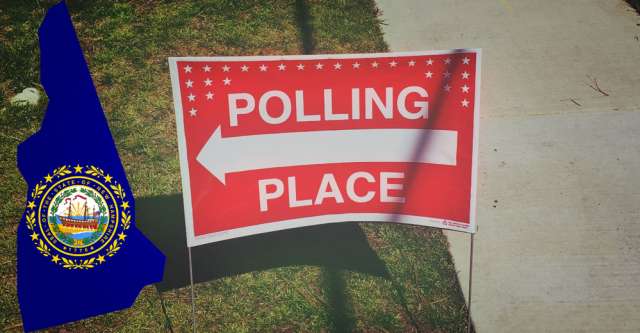New Hampshire set a record in the 2020 election for the largest discrepancy between machine and hand counts for any election in the history of the state [1]. The discrepancy occurred in Windham county and the Windham Board of Selectmen held a public meeting on Monday night to discuss the matter. The board voted 3 for the team of Dr. Andrew Appel and Mark Lindeman’s Verified Voting to conduct the Audit and 1 (Bruce Breton) voted for Jovan Pulitzer to be Windham’s forensic analyst.
It was then reported that New Hampshire officials selection of Verified Voting brought on an individual named Mark Lindeman, who alleged the election fraud claims were fake and worked to try to get the Maricopa County, Arizona audit shut down.
Lindeman had signed onto a letter penned by Paige Alexander, CEO of Carter Center on April 13, 2021. In the letter Alexander asserted that the Maricopa County audit would have “little value other than to stoke conspiracy theories and partisan gamesmanship—or worse [2].”
Verified Voting Is Not Verified
In December of 2019, a whole year before the 2020 election, Verified Voting was facing board resignations and whistle blowers [3] condemning the organizations associations with commercial interests while holding a 501(c)(3) status [4], and its position that “risk-limiting audit (RLA),” processes determine with 95% accuracy that the vote was legitimate.
Richard DeMillo, a Georgia Tech professor who sat on Verified Voter’s advisory board, left the group in December 2019. UC Berkeley statistics professor Philip Stark, also a board member, resigned November 21, 2019.
paper ballots provide no assurance unless they accurately record the vote as the voter expresses it.
Demillo and Stark wrote a paper [5] in April of 2019 spelling out the problem with these machines and any RLA they might to develop for an audit, writing: “Computers, including all modern voting systems, can be hacked and misprogrammed. The scale and complexity of U.S. elections may require the use of computers to count ballots, but election integrity requires a paper-ballot voting system in which, regardless of how they are initially counted, ballots can be re- counted by hand to check whether election outcomes have been altered by buggy or hacked software.”
BMD’s Introduce A Hackable Layer Between Voter and Ballot
The major problem with BMD’s (ballot marking device systems) is that it introduces a layer between the voter and the ballot. It creates the ballot to be scanned. Demillo and Stark argue “research shows that most voters do not review paper ballots printed by BMDs, even when clearly instructed to check for errors.” They conclude “paper ballots provide no assurance unless they accurately record the vote as the voter expresses it.”
Don’t worry: Verified Voting will teach you to sprinkle magic RLA dust and fantasies about parallel testing on your untrustworthy election. All will be fine; you can use our authority and reputation to silence your critics.
A couple of problems, according to DeMillo and Stark, are “Voters can make mistakes in expressing their intent in either technology, but only the BMD, is also subject to systematic error from computer hacking or bugs in the process of recording the vote on paper, after the voter has expressed it. A hacked BMD can print a vote on the paper ballot that differs from what the voter expressed, or can omit a vote that the voter expressed.” That’s one issue, but here is the second issue, “It is not easy to check whether BMD output accurately reflects how one voted in every contest.”
RLA’s (Risk Limiting Audits) Cannot Be Trusted
An RLA in it’s current form, according to Stark, cannot be trusted “Because there is software between the voter and the paper, what the paper shows might not be what the voter did or saw . . . on the device [6].” He also said “Our message to jurisdictions that buy poorly designed, insecure, universal-use BMD should be, ‘We tried to warn you. You need a better voting system’ … Instead, we’re saying, ‘Don’t worry: Verified Voting will teach you to sprinkle magic RLA dust and fantasies about parallel testing on your untrustworthy election. All will be fine; you can use our authority and reputation to silence your critics.’ [7].”
DeMillo states that “Verified Voting’s (VV) seal of approval for the security theatrics in Bartow County (Verified Voting’s was involved in a Risk Limiting Audit (RLA) pilot in Georgia) undermines efforts to make elections more accountable. … No audit based on an untrustworthy audit trail can confirm the correctness of the outcome. Billing such an exercise as an RLA and touting it as a proof of security plays into the hands of cynics [8].” He also said in his resignation letter that Verified Voting’s involvement in Georgia’s RLA following the contested 2018 election “makes it impossible to continue as a member of the advisory board. VV issued and supported misleading public statements that those pilots confirm outcomes and even prove the security of new election systems [9].”
Notes:
- ^ Hoft, J. (2021). Windham Selectmen Get Caught! City Officials Chose Voting Group THEY KNEW Was Known for Providing Cover for Voting Machine Companies and an “Absence of Values”. Gateway Pundit. Retrieved from https://www.thegatewaypundit.com/2021/05/windham-selectmen-get-caught-city-officials-chose-voting-group-new-known-providing-cover-voting-machine-companies-absence-values (go back ↩)
- ^paige-alexander-letter-az.jpg (JPEG Image, 584 × 763 pixels). (2021, April 27). Retrieved from https://www.thegatewaypundit.com/wp-content/uploads/paige-alexander-letter-az.jpg (go back ↩)
- ^ Supervisor Warren Slocum asked to Resign from Verified Voting. Why does he have to be asked? (2019, December 23). Retrieved from https://sanmateocountynews.com/2019/12/23/supervisor-warren-slocum-asked-to-resign-from-verified-voting-why-does-he-have-to-be-asked (go back ↩)
- ^Supervisor Warren Slocum asked to Resign from Verified Voting. Why does he have to be asked? (2019, December 23). Retrieved from https://sanmateocountynews.com/2019/12/23/supervisor-warren-slocum-asked-to-resign-from-verified-voting-why-does-he-have-to-be-asked (go back ↩)
- ^ Appel, A., DeMillo, R., & Stark, P. B. (2019, April 21). Ballot-Marking Devices (BMDs) Cannot Assure the Will of the Voters. doi: 10.2139/ssrn.3375755 (go back ↩)
- ^ Sullivan, M. (2019). Two experts quit election accountability group over claims it has been endorsing untrustworthy machines. Fast Company. Retrieved from https://www.fastcompany.com/90441559/two-experts-quit-election-accountability-group-over-claims-it-has-been-endorsing-untrustworthy-machines (go back ↩)
- ^Supervisor Warren Slocum asked to Resign from Verified Voting. Why does he have to be asked? (2019, December 23). Retrieved from https://sanmateocountynews.com/2019/12/23/supervisor-warren-slocum-asked-to-resign-from-verified-voting-why-does-he-have-to-be-asked (go back ↩)
- ^Supervisor Warren Slocum asked to Resign from Verified Voting. Why does he have to be asked? (2019, December 23). Retrieved from https://sanmateocountynews.com/2019/12/23/supervisor-warren-slocum-asked-to-resign-from-verified-voting-why-does-he-have-to-be-asked (go back ↩)
- ^Supervisor Warren Slocum asked to Resign from Verified Voting. Why does he have to be asked? (2019, December 23). Retrieved from https://sanmateocountynews.com/2019/12/23/supervisor-warren-slocum-asked-to-resign-from-verified-voting-why-does-he-have-to-be-asked (go back ↩)

